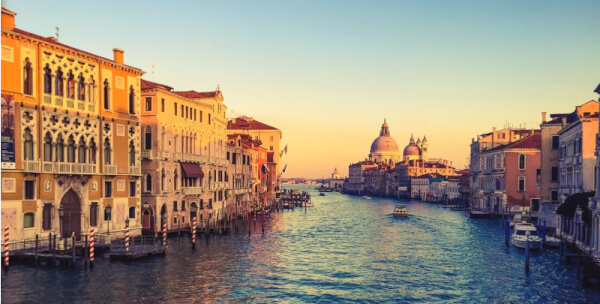Want Italian dual citizenship or nationality? Read this guide.
Here’s the lowdown on who can apply and how you go about getting dual citizenship with Italy.

Whether you prefer high fashion and fast cars, or history and culture, life in Italy can certainly be appealing. The combination of a high standard of living, thriving cities and a mediterranean lifestyle attracts many foreigners who come to Italy to live, work and play.
If you're thinking of moving to Italy as an expat, and plan on finding employment while you're there, then you might need to get a work visa first. Read this guide guide to getting an Italian work visa.
Your first priority should be to figure out if you need a work permit at all. In some cases, depending on your nationality and the role you’re going to take on, a permit might not be necessary.
Italy is a member of the European Union (EU). Therefore, if you're a citizen of another EU country, Norway, Iceland, Liechtenstein or Switzerland, you don’t need a permit to live or work in Italy. If you're from elsewhere, then you can check the visa requirements in the EU immigration portal by filling in details of your nationality and the type of work you intend to do.
It's worth noting that Italy uses a quota system for visas for most occupations. This means that you can only be offered a working visa if you fulfil all the relevant criteria, and the quota hasn’t already been hit by the time your application is processed. Some occupations, where there's a shortage of workers, aren't subject to quotas. Similarly, if you're transferring with the same employer for a short period of time, you might be exempt from the quota numbers.
To get an Italian work visa you must first secure a job. This is because your employer completes most of the work visa application process on your behalf. They must start by applying for an authorisation from the Single Desk for Immigration at their local Prefettura. Italy's Interior Ministry website gives more details about where this initial application can be filed.
Because the process is administered regionally, the exact requirements might vary slightly depending on the area in which you plan to work.
If your application is successful, and as long as the quotas for immigration haven’t already been reached (or if you're coming to do a job which is exempt from quotas), your employer will be given your ‘authorisation to work’. The local Prefettura will then inform the Italian consulate or embassy in your home country that your application can go ahead. All the documents which have already been submitted by your employer are sent electronically to your local embassy, so you shouldn’t need to provide paperwork in duplicate.
Your local embassy will provide you with an entry visa, which should take less than thirty days. From the point at which your authorisation is confirmed, you'll have six months to go to your local Italian embassy and collect your visa.
More useful information can be found at the European Commission mobility portal, EURES, and the EU Immigration Portal.
As your employer must apply for a visa on your behalf, you can expect them to ask you for some paperwork. Your employer must tell the immigration authorities about the role you'll do, and your arrangements for living in Italy during the contract period. Documents they’ll provide to the authorities vary by prefecture and include:
A valid passport
Your residence contract (in Italian), which you must also sign
Proof you can fund your return journey
You might also have to provide proof of your qualifications and your resume
Once your employer has submitted these documents to the local Single Desk for Immigration, the Italian authorities will check for bars to entry before issuing the authorisation to work.
Depending on the type of work you're planning on doing, it might be possible to apply for an EU Blue Card. Similar to the US Green Card, this document gives you the right to work across most EU member states (excluding Denmark, Ireland and the UK). To be eligible for a Blue Card, you must be from a country outside the EU, be highly skilled (typically meaning you’ve completed a bachelor's level university degree, or have five years of senior professional experience), and have a binding job offer or active work contract.
The Blue Card application process is fast tracked by member states, meaning it's typically quicker than other forms of work visa application. However, it may still take up to three months. Although you start the application process online through a single point of contact, the process may vary depending on your personal circumstances.
| Create your resume with the best resume template now. |
|---|
Seasonal workers will need to apply for a visa in the same way as outlined above. The employer takes the lead role in this application, and visas tend to be issued for six months. After this, an extension of up to a further three months can be applied for.
Most student visas will allow you to work for up to twenty hours a week while you're in Italy. You should check the specific terms of your visa before finding a job.
If you're under 30 and a citizen of Australia, New Zealand, or South Korea, or under 35 and from Canada, you can apply for a one year visa which allows you to travel to Italy and work while you're there. If you're Canadian you may be able to apply for this visa type for up to two years. To be eligible you have to prove your means of support and confirm that your primary intention is to travel with work as an incidental rather than main feature of your plans. Your local embassy can provide further details about this visa option.
If you plan to work for yourself when you're in Italy you'll need to apply for a self employment visa, following much the same process as outlined above. The process is administered regionally alongside the chambers of commerce. Requirements vary and aren't always fixed, but dealt with on a case by case basis. You’ll need to apply to the chamber of commerce for a certificate confirming their approval of the business you're hoping to open. To get this you'll have to prove your funding and qualifications, as well as show a business plan and credentials. Self employment visas tend to be issued for two years.
If you're moving to Italy to start an innovative startup business, or work with a certified startup incubator, then you might be eligible for a specific startup visa. Full details are available at the Italian government's dedicated startup visa website.
Holders of the EU Blue Card are able to apply for visas on behalf of family members without a waiting period under the family reunification scheme. If you have a work visa for one year or more, then your family members can travel to Italy with you as long as you’ve completed the application processes at your local embassy in your home country. They’ll need to provide application forms, a valid passport, proof of income and accommodation, and details of family relationship. You might also have to provide health information depending on the specific circumstances.
If they don't come to Italy at the same time as you, you can apply later for long term residence permits for family members such as a spouse, children or dependant parents so they can join you under the family reunification program. Application processes vary depending on the specific details, but your family member will need to provide a valid passport, photographs, a clean criminal record, proof of relationship, and an application fee. The application fee is currently €27.50. More information is available in the Italian police guide in regards to confirming the legality of your stay in Italy.
Within eight days of arriving in Italy you must visit the Single Desk for Immigration at your local Prefettura (closest to where you'll work), to get a residence visa. Failing to do this means you're technically in the country illegally.
During this appointment you'll need to have all your personal and employment data verified, and receive a fiscal code which is used for tax registration. You’re then required to visit a post office to get the login details to allow you to track the progress of your application online. You'll also need to attend a further meeting to provide photos and fingerprints for the residence permit. The residence permit is then issued, and the Provincial police are notified of your visa status.
The process to get an Italian working visa does include a few separate steps, but luckily many of them are taken care of by your employer. Once the application is approved, you can mark it off your list, and get back to the much more enjoyable business of planning the details of your move.
To get the most of your money in Italy, you'll want to open a bank account in Italy, which you can do before you arrive.
Once you need to send money either to or from the Italy, consider using a money conversion service like Wise to avoid unfair exchange rates. There's a small transparent fee, and when your money is converted from one currency to another you’ll get the real exchange rate - the same one you can find on Google. Not only that, but Wise receives and sends money via local bank transfers instead of internationally, further saving you money by cutting out hefty international transfer fees.
If your trip is short or opening a bank account in Italy isn't an option, you can always withdraw money from your foreign account using an ATM there. Just keep in mind it'll be more favorable to agree to be charged in the local currency, not your home currency.
Regardless of when you start your new job abroad, it should be fairly straightforward to get yourself a visa if you follow the right steps. The most important part is just to make sure to enjoy your new adventure.
*Please see terms of use and product availability for your region or visit Wise fees and pricing for the most up to date pricing and fee information.
This publication is provided for general information purposes and does not constitute legal, tax or other professional advice from Wise Payments Limited or its subsidiaries and its affiliates, and it is not intended as a substitute for obtaining advice from a financial advisor or any other professional.
We make no representations, warranties or guarantees, whether expressed or implied, that the content in the publication is accurate, complete or up to date.

Here’s the lowdown on who can apply and how you go about getting dual citizenship with Italy.

Getting married in Italy is relatively straightforward. Like any wedding though, it requires advanced planning, as well as a basic understanding of the law....

Have you ever considered moving abroad? There are a ton of valid reasons to do so. You could be looking for a new job or going to school. You could be...

So, you’ve watched La vita è bella (Life Is Beautiful, 1977) one too many times and have decided to move to Italy. Great choice, although hopefully you have...

It might be Italy’s second city, but Milan is the heart of the country when it comes to finance and fashion. The large financial sector in particular means...

Italy is famed for its culture, food and lifestyle, making it no surprise that many foreigners move there to live and work, both in the large cities and off...